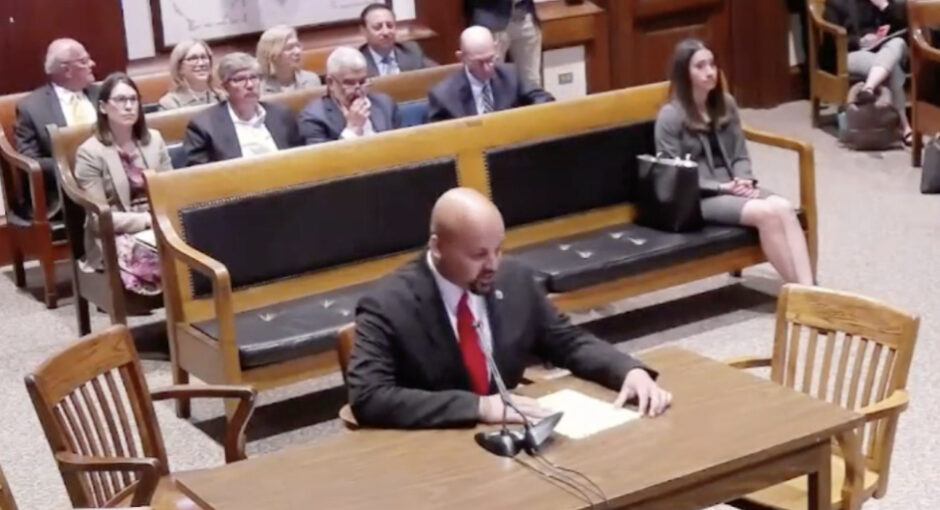Companion bills in the Massachusetts House and Senate would restore the 340B program’s intent by stopping pharmacy benefit manager discrimination against any 340B covered entities and their contract pharmacies, the sponsor of the state Senate bill said during a recent joint legislative committee hearing.
“PBMs use tactics to transfer savings away from health centers and towards themselves,” state Sen. Pavel Payano (D) told the Joint Committee on Financial Services at the May 16 hearing. “These tactics include requiring the health center to accept dramatically lower reimbursement for a drug purchased under 340B than if it is purchased outside the program. This bill would restore the intent of the 340B program.”
Payano’s bill, S.704, would ban certain PBM polices including discriminatory reimbursement and imposing conditions such as added fees on 340B entities and pharmacies based on their 340B status. State Rep. Daniel Cahill (D) sponsors the House version, H.959.
There has been no further action on the legislation since the hearing, a state House contact with the joint committee said.
The legislation says no insurance company that reimburses a 340B covered entity or its contract pharmacy for 340B drugs:
- Shall reimburse a covered entity or contract pharmacy in an amount less than such plan, issuer, or manager would pay to any other similarly situated non-340B entity on the basis of 340B status or dispensing 340B drugs.
- Shall discriminate against a 340B covered entity or contract pharmacy by imposing requirements, exclusions, reimbursement terms, or other conditions that differ from those applied to non-340B entities or pharmacies on the basis of 340B status or dispensing 340B drugs.
- Shall impose any of the following terms or conditions on 340B-covered entities or contract pharmacies that differ from those applied to non-340B entities or pharmacies on the basis of 340B status or dispensing 340B drugs:
- Fees, chargebacks, clawbacks, adjustments, or other assessments.
- Professional dispensing fees.
- Restrictions or requirements on participation in standard or preferred networks.
- Requirements on frequency or scope of audits or inventory management systems.
- Requiring drug claims to include a 340B modifier or other 340B claim identifiers.
The legislation also bans any policy that effectively “prevents, steers, or otherwise interferes with “a patient’s choice to receive drugs from the 340B entity or its contract pharmacy.
“A growing number of entities that health centers must contract with … including pharmacy benefit managers and health insurers discriminate against 340B entities to such a degree that 340B savings are dramatically reduced or eliminated,” said Diane Martin with the Greater Lawrence Family Health Center at the hearing. She said that the health center’s more than $17 million in annual 340B savings goes largely to support outreach and pharmacy programs.
“We treat those patients who have fallen through the cracks … without medications or without insurance,” she said. “Our 340B savings continue to diminish, yet the need for patient access to healthcare continues to surge.”
She added, “While the worse of the pandemic is over, it has left in its wake, an overwhelming demand for services as a result of deferred care, a burnt-out workforce leaving the field, and a loss of federal dollars that allowed safety-net providers to recruit and retain their staff. All of those factors coupled with the loss of 340B savings … have left many Massachusetts community health centers wondering if they can keep their doors open. We must act urgently to ban these [PBM] practices.”
Roberlyne Cherfils, chief operating officer at the Edward M. Kennedy Community Health Center, which operates sites in Worcester, Framingham, and Milford, told lawmakers that a large chunk of the health center’s roughly $3 million in annual 340B savings goes to support clinical pharmacy services and translation services, with the center’s patient base representing 84 different languages. “Any further reduction to savings in the 340B program will be devastating for all of our health centers,” she said.
Cherfils said giving the U.S. Health Resources and Services Administration more authority to regulate PBMs’ 340B policies will be a protracted process. “Bipartisan reform is often very difficult to achieve,” she said. “Health centers and their patients cannot wait for Congress to act.”
“It’s time for payers and insurers to recognize the importance of federally qualified health centers and the work we do, and treat us with the respect and fairness we deserve,” Dr. Juan Jaime de Zengotita, medical director with Boston-based FQHC and Ryan White clinic Fenway Health, told the committee. “The payment rates and requirements that payers and insurers impose on [FQHCs] like Fenway Health presents us the greatest problem.”


